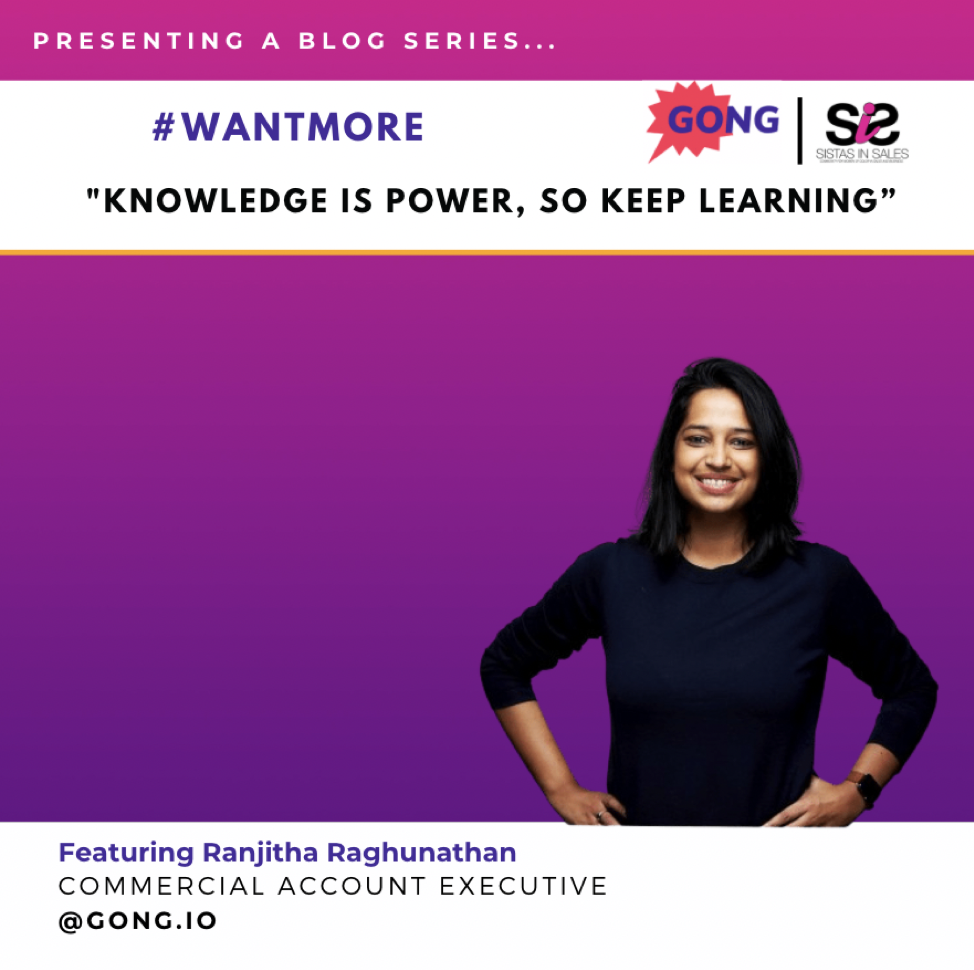#WantMore: Knowledge Is Power, So Keep Learning

Meet Ranjitha Raghunathan, Commercial Account Executive at GongInterviewed by Florence Madenga “Find your own personal board of directors” On The Pandemic For many people, a global pandemic may look like the worst time to be starting a new job at a new company. For Ranjitha Raghunathan, her first two months at Gong have encompassed some of the best teamwork she’s experienced in a workspace, even without the “space.” At a time where professional relationships are being tested, Ranjitha is thriving. “Obviously we have all been remote and I haven’t met many of them personally,” she says of her team and colleagues. But “they’ve been super helpful. And I think Gong as a tool and a platform itself actually helps me become a better salesperson every day. I couldn’t be happier.” As a commercial account executive, Ranjitha works with smaller companies — this means the size is anything from one employee to 250. The “small and mid-sized business” (SMB) space requires a lot of cold calling, identifying exciting business prospects, and building relationships. It means understanding priorities, fit, and roles — the ones people say they hold, as well as the unspoken concerns, values and responsibilities. While much of this comes naturally to Ranjitha, what made her career transition so painless is that within the first month in her role, she participated in Gong’s mentorship program, which encourages employees to “reach out to anyone to get some help.” She did just that. Ranjitha found herself “leaning a lot on teammates and colleagues” that have quickly turned into friends. She describes this culture as “feedback forward,” a part of the #NoSugar Operating Principle, which fosters an environment where everyone can improve daily and own their own way of selling. Employees are encouraged to be direct, speak their mind, and expect the same from their peers. On Trying Again Ranjitha’s journey to Gong has been two years coming. The first time she applied for a position there, she did not get the job. “I was not qualified by any means to get that job,” she says. But that didn’t mean she stopped. She honed her skills at Salesforce as a new business account executive, and then an SBE account executive, where she consistently outperformed expectations and was a peer-elected team lead. Meanwhile, before she applied a second time at Gong, she combed through much of the content the company was generating, from podcasts and YouTube Video content, to reading more about the industry. “So when they reached out to me, it was a fangirl moment, really,” she says. She breezed through the interview process and found herself at Gong, now as a commercial account executive. Like her arrival to Gong, Rajintha’s arrival to sales has not been linear. It has culminated in journeys across the Atlantic, and interests that she’s gleaned at several other moments in her life. Seven years ago, she moved to the U.S. from India. Prior to that, she was a software engineer, and quickly realized engineering was not something she was passionate about. She then worked for a small wind energy startup where she got into sales, business development, and realized: “Well, it’s like I’ve been doing sales all my life and I just had no idea.” Additionally: “I firmly believe that you don’t technically need to have a title to be in sales,” she says. “I was always selling. You just don’t know what you’re selling, or you could be selling yourself every day.” On Not Selling Out But how do you “sell yourself” without…well, selling yourself? On applying to a sales job (which can be meta because the process itself is an exercise in sales), Ranjitha recommends sticking to who you are. “I think specifically for women of color, it’s important that you own it,” she says “If you’re going to be different, you’re going to sound different. You’re going to look different. And that’s what brings your unique perspective to your job. That’s what makes you stand out and really hone in on those skills.” Here, Ranjitha is speaking from experience. As a brown woman in sales, she has been asked to “tone it down,” to “not be so direct,” so “soften the blow” and adhere to more stereotypical feminized and racialized modes of behavior in the workspace. “I was never a fan of that because that’s not who I am,” she says. “If I was going to take so long to write an email, she says, as has been recommended by some to “tone down” her approach, “the email I’m sending out is really not something I would even say.” So instead of finding another voice, Ranjitha would rather spend time finding her own. “The minute you start imitating someone else, you are going to forget it, you’re going to hate it, and nobody wants that,” she says. “And just to think, you know, the challenges that come with being a woman in sales and in such a male dominated field is a job by itself.” It is because of this reason, and the notion that sales as a career can be “super controlled,” that well-intentioned close friends and family, knowing her personality, warned her not to enter sales. She knew things like “having an accent” and coming from a different country would mean dealing with prejudice. Dealing with this has required having more open and honest conversations around diversity and inclusion. “People don’t realize that we’re not stupid,” Ranjitha says. “Someone says, ‘hey, don’t be in sales.’ Literally, the first question that comes to mind is ‘Why? Do you think I sound different?’ That’s my first question. It’s unfortunate that it’s common, but I think thankfully that times are changing.” On Finding Your Own Personal Board of Directors What has also helped that change is other women supporting each other. “I think people who I admire the most are people who care, like they really really care, and not just say they care,” she says. “There’s a big difference between the two, and people don’t really realize that.”
